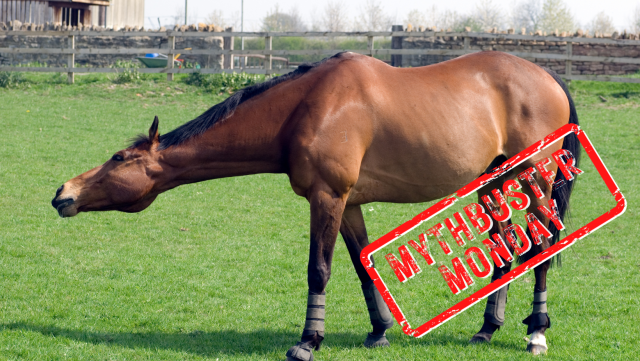
Mythbuster Monday: Horses Stretch Their Necks When They Have a Sore Throat
On Mythbuster Monday, we tackle a variety of equestrian myths to either bust or confirm. Today’s discussion: Do horses only stretch their necks when they have a sore throat?
It’s Mythbuster Monday, where Horse Nation dives into different equestrian myths and provides research-based evidence to either bust or confirm those myths. Today’s topic: Do horses only stretch their necks when they have a sore throat? Can it mean something else? When should you call the vet? Do horses get Strep Throat? Read further to find out!
Myth: When a horse stretches his neck it means he has a sore throat
Myth or Fact: Both
Just as humans get sore throats and pass them around, the same goes for horses. Horses can obtain sore throats from allergens, bacteria, and viruses of the respiratory tract. Irritants can cause inflammation of the throat causing swelling, drainage, and a sore throat.
But does a horse stretching out his neck correlate directly to a sore throat?
According to an article by Horse Side Vet Guide, a horse stretching his neck does not necessarily mean that he has a sore throat. Further exam should be conducted to get to the root of why the horse is stretching his neck. The repeated stretching of a horse’s neck could mean the horse has a sore throat but it could also be a sign of mouth, jaw, and/or neck injury. Some horses also show abdominal pain, colic, and back pain by stretching the neck. Although it’s not necessarily neck pain, horses that have an esophageal obstruction — or choke — will also stretch their necks in an attempt to clear the pharynx. Another thing that may cause a horse to stretch his neck can also include dental/teeth problems.
The article by Horse Side Vet Guide also states that to narrow down if it is a sore throat or something more involved, other symptoms should be observed. Some accompanying symptoms include abnormal chewing, heat, swelling, or pain at a localized spot, fever, drooling, dropping feed, not eating, depression, lethargy, wood chewing, coughing, and pain responses.
To fully diagnose whether your horse has a sore throat or something more, you should schedule an exam with your veterinarian. If the horse seems to move freely and has normal attitude and appetite, schedule a routine exam. If the horse has a fever, elevated heart rate, and/or seems to be in distress, schedule an emergency visit to diagnose the problem.
Novafon wrote an article that has a more holistic approach. Just like humans, when one part of the body is affected by something, other parts of the body are also affected. A horse may stretch his neck due to a sore throat, but that may not be the root cause. The throat may be sore due to one of the many muscle chains that are connected to it. When a horse pulls on a bit or is tied too tightly, this may cause issues in the jaw, spine, and back muscles — eventually creating a sore throat due to their interconnection.
Horses in certain disciplines — such as dressage and jumping — may begin extending their necks later in their life depending on how they have been ridden. If their riders held their necks too tightly with extreme contact, this begins to create calcifications on the neck ligaments. It starts as inflammation and discomfort that the horse is trying to release, so you’ll see him stretching his neck frequently when not under saddle. After years of training this way, it is not uncommon for these show horses to exhibit severe cervical spine issues, coordination difficulties, and swallowing issues.
Overall, there are many reasons a horse will stretch his neck. It may not necessarily mean your horse has a sore throat or sickness. Horses may repeatedly stretch their necks due to inflammation, choke, or pain in various areas. They may also do so because they do in fact have a sore throat. The best way to diagnose the root of the issue is to make an appointment with your veterinarian.
Do you have an equine myth you’d like us to tackle? If so, send it our way! Email your suggestions to [email protected]. Put Mythbuster Monday in your subject line.









